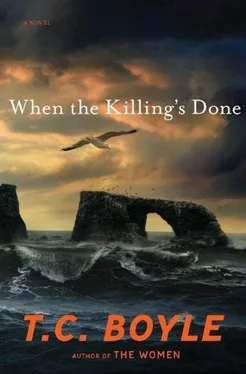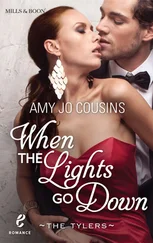Then one afternoon a girl he’d hired to work the front counter while he was out doing installations handed him a slim pamphlet with an earth-green cover adorned with the old hippie sign for peace. He’d just come in the back door after fielding a complaint from a middle-aged woman with seriously sun-damaged skin who’d berated him because the remote wouldn’t switch on the amplifier in the new system he’d installed for her just the week before (she was pointing it backward, he discovered, after wasting a good forty-five minutes checking out every possible glitch he could imagine) and he looked down at the pamphlet in disgust. “What is this?” he asked the girl, turning it over in his hand. He gave her a sharp glance. “I hope you’re not handing this shit out in the store, because if you are—”
“It’s not shit,” she said, her voice so soft it was almost a whisper. “And I’m not passing it out to customers, don’t worry.” Her name was Melody Appelbaum — it comes to him in a flash while he sits there in the netherworld of the courtroom, Sterling droning on about something and the judge looking as if he’s on the verge of passing out — and she was a student at UCSB. She shrugged. “I just thought you might find it significant, that’s all.”
Significant . He might find it significant. Not useful or eye-opening or revolutionary, just significant. Without thinking, he stuffed it in the back pocket of his jeans, and it wasn’t until he was getting ready for bed that night that he discovered it there. Idly, he flipped it open. The title— Animal Rights —appeared at the top of the first page, the letters faintly blurred in the way of cheap reproduction. Beneath it was a quote from Arthur Schopenhauer: “The assumption that animals are without rights and the illusion that our treatment of them has no moral significance is a positively outrageous example of Western crudity and barbarity. Universal compassion is the only guarantee to morality.” There was no author listed, and aside from a copyright symbol at the bottom of the page, no publication data at all.
He turned the page on a collage of photos that radiated out from the center like the petals of a black-and-white flower. It took him a moment before he saw what they were. And when he saw and understood, he experienced a jolt of revulsion and morbid fascination that was no different from what he’d felt when he was in junior high and came across the photographs of the victims of the Nazi camps in a claustrophobic carrel in the back room of the library. But the victims in these photographs weren’t human — they wore the mute unrevealing faces of cattle, hogs, veal calves, of chickens, their wings flapping futilely against the clamp of the conveyor and the blade to decapitate them. He looked closer. One of the animals, a hog that had been strung up by its feet in the slaughterhouse amidst myriad others, stared back at him, fully conscious and headed for the eviscerator looming in the foreground.
On the next page, there was more of the same — turkeys, lambs, dogs in a pen at the animal shelter awaiting the burn of the needle. And then the text, which put numbers to the slaughter, eight billion chickens butchered each year in this country alone, a hundred million hogs, forty million cows (twenty-five percent of which had been carelessly or inadequately stunned and thus effectively skinned alive, their writhings as the skin is torn from their faces a regular feature of the assembly line). And the line never slows, not even when the hogs come to and break loose of the shackles to careen in a panic into the pit below or when the shrieks of the ones crowding behind cause them to freeze in the chute till they’re beaten and electroshocked into moving. He read of the conditions in the farm factories, of pigs raised in pens so small they can’t even turn around, not once in their whole lives, of chickens debeaked and caged in warehouses with a hundred thousand others, knowing nothing but concrete and wire and the reek of death. Then there were the animal experiments — kittens having their eyes sewed shut to study the effect of sightlessness on development; rabbits subjected to the Draize test, in which a chemical irritant is dripped into their eyes by way of evaluating products in the cosmetics industry; dogs injected with plutonium; monkeys deprived in every conceivable way, tortured, mutilated; rats uncountable bred only to suffer and die, transgenic rats, oncogenic rats, rats upon rats.
He read the pamphlet through twice that night and in the morning he brought it with him to the store and laid it down on the counter without a word, right next to the cash register. Melody Appelbaum, nineteen, pouty, fat-cheeked, expecting trouble, gave it a glance, then looked away. “Where’d you get this?” he demanded.
She shrugged as if to say it was nothing, no more consequential than an advertising flyer, that she hadn’t meant any harm, that she’d take it back and never mention it again. “At school,” she said finally. “From a PETA person? Actually, my boyfriend.”
And he’d been so far out of the loop he had to ask what PETA was.
“It’s a group, you know? Activists. People for the Ethical Treatment of Animals?”
He mulled that over a moment, watching her eyes, animal’s eyes, no different essentially from the eyes of that hog or of dogs, cats, even fish and insects, organs of seeing and apprehension, windows to the soul. “Can you get any more of them?”
Another shrug. “I guess.”
“A hundred? Five hundred?”
“I guess.”
“Good,” he’d said. “I’m going to want them right here, right by the register. And you hand them to anybody who walks in the door.”
That was the day he gave up meat, cold turkey, and where did that expression come from? Of course, he still needed protein, especially since he was lifting at the gym, which was all about results, and so he continued to incorporate eggs and dairy in his diet, though he knew all about the battery hens in the egg-laying factories, how they’re fed the remains of the male chicks, which are otherwise useless to the industry, how they’re subjected to forced molting (that is, they’re periodically denied food for six to ten days and then brought back on diet as a way of forcing ovulation), and how after a year they’re played out and sent to slaughter. Anise is on him all the time about it — not to mention his cardiologist — but eggs are his one concession to the system, to cruelty. He means to change. He will change. Anise is a vegan and he’s moving that way, he is, but it’s hard, because through all his bachelor days from his divorce on up to the present, it’s been eggs that sustained him. Omelets, especially. In fact, the first time he had Anise over for dinner, he made a green salad and a veggie omelet — his specialty — thinking it would be just the thing, till she sipped at her wine, picked at the salad, gave him the full chill of her glacial gaze and said, “Meat is murder. And so are eggs.”
Now, sitting in the courtroom with her four years later, he comes out of his reverie to hear Sterling laying into Sickafoose, the tedious dead dry-as-dust voice come to life suddenly: “So you can’t be sure then which of the two men you saw — at a distance of what, a thousand yards? — making throwing motions?”
And Sickafoose, shifting in his seat, knotting and unknotting his bony legs, drawn down to nothing finally, and finally, in a whisper, saying: “No.”
“I’m sorry, I didn’t hear you.”
“No. I can’t be sure.”
Anise turns to him suddenly and she’s huge, rippling, her face floating to his like an untethered balloon, the kiss, the squeeze. Is this it? Have they finally conceded, the sons of bitches, the killers, the — And then suddenly, unaccountably, he’s back on the boat, the paradisiacal island rising up out of the sea before him. “Do you know why they call it Coches Prietos?” she’s asking him, the post-coital margarita rocking gently on the rail.
Читать дальше












